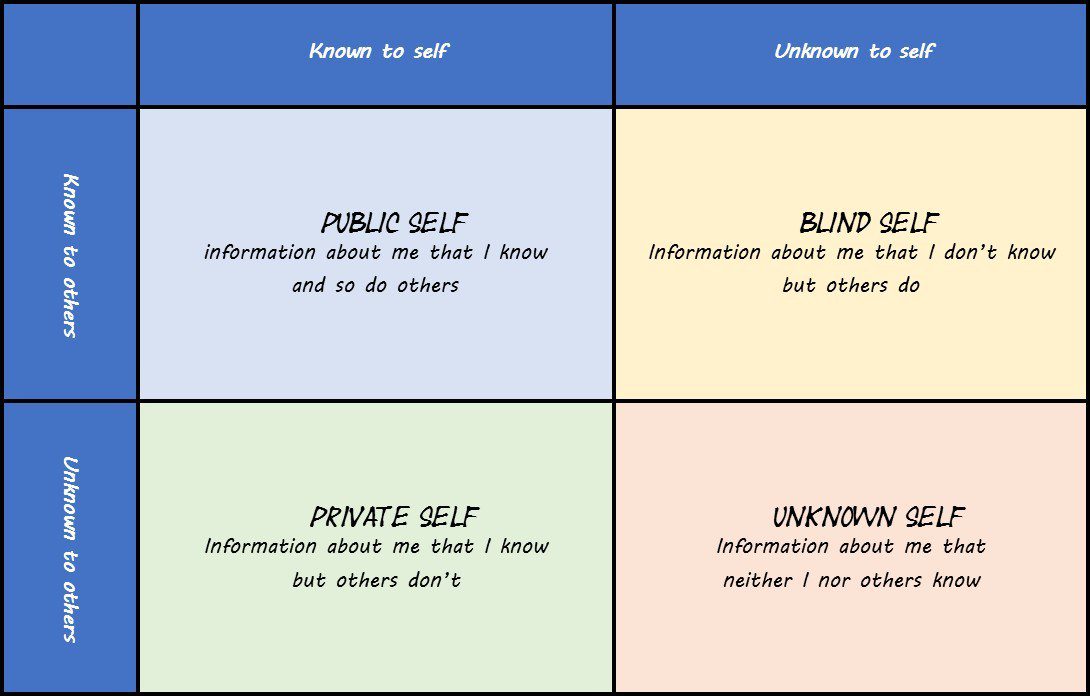The Johari Window is a visual framework for understanding your conscious and unconscious biases. It is a tool that helps you know yourself, how people see you, relationship dynamics, and your blind spots. It was invented in the 1950s as a tool for mapping personality awareness. The Johari Window was created by two psychologists, Joseph Luft and Harrington Ingham. The name Johari is derived from the combination of the first names of the creators: Joseph and Harrington.
The model is a 2×2 grid, which represents things that a person knows about themselves on one axis and things that others know about them on the other axis. By plotting the levels of self-knowledge and the knowledge held by others, the person can develop a greater understanding of their personality and how others perceive them.
The Johari Window has four quadrants/windows/areas.
The Open Self
The open quadrant is our conscious self, the part of us that is well-known to us and others. They include our attitude, behaviour, motivation, values and way of life. In this window, we are conscious, move with freedom and we are an open book.
The Hidden Self
This window includes the things that our peers are unaware of about us, but we know within ourselves to be true.
The Blind Self
This window includes the information about ourselves that we don’t know but others know about us.
The Unknown Self
The information about you that neither you nor others know. These are the adjectives not selected by the subject or their peers. The unknown section represents the subject’s behaviours or motives that are unknown.
From a therapeutic perspective, expanding the open quadrant at the expense of both the unknown window and the blind spot results in greater self-awareness. In comparison, the voluntary disclosure of the private quadrant may result in greater interpersonal friendship and intimacy. Chinese Military strategist, philosopher and author of The Art of War, Sun Tzu, once quipped “If you know the enemy and know yourself, you need not fear the result of a hundred battles. If you know yourself but not the enemy, for every victory gained, you suffer a defeat. If you know neither the enemy nor yourself, you will succumb in every battle.” The Johari Window is a great tool for better understanding of oneself. The more you know who you are as a person, navigating the vicissitudes and radically accepting whatever happens to you in life becomes easier.
In Never Eat Alone, Expanded and Updated: And Other Secrets to Success, One Relationship at a Time, authors Keith Ferrazzi and Tahl Raz advised: “Adjust Your Johari Window”.
The Johari Window is a model, invented by two American psychologists, that provides insight into how much people reveal of themselves. Some people are introverted, revealing little; they keep their window relatively closed. Other people are extroverted, revealing a great deal and keeping their windows open. These tendencies also fluctuate in different environments. In new and strange situations, with people we are unfamiliar with, our window remains small; we reveal little and expect others to do the same. If, on the other hand, the climate is safe and trusting, with others that are similar to us, we share more of ourselves. Our windows open wider. Successful communication depends, according to the model, on the degree to which we can align ourselves and our windows to match those we interact with.
Every person’s Johari Window can be more or less open depending on the circumstances. And different professions—from those that demand a lot of interpersonal skills, like sales, to those that, like accounting, are generally more solitary—attract people whose windows share similar tendencies. A computer programmer’s window, for example, may not open wide unless he or she is around peers. A strong marketing person’s window, on the other hand, tends to be open regardless of the environment.
Meditation
Podcast
- The art of Letting Go with Vincent and Andrew Kitirattragarn of Dang Foods | How I Built This with Guy Raz
All the Best in your quest to get better. Don’t Settle: Live with Passion.

Comments are closed.